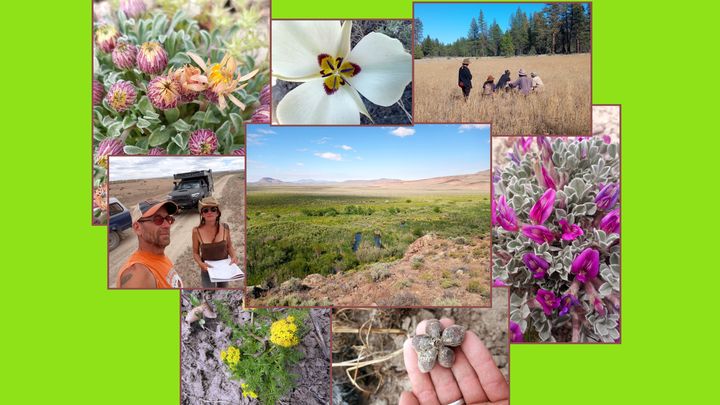
Lithium Lands Fellowship: Field Study and Stories
Tax deductible
Nikki Hill and Groundwork are seeking funding for a Lithium Lands Fellowship happening this April, 2023. This month-long immersion camp in far southeast Oregon is an endeavor in observation, documentation and storytelling centered on the ecological relationships and cultural heritage which are threatened by the proposed McDermitt Lithium Project.
The northern edge of the McDermitt Caldera has recently garnered attention for containing the largest lithium deposits in the US. The caldera lies within the vast sagebrush sea, which is one of the largest continuous landscape types in North America, but also one of the most at-risk, with only 5% receiving protection at the federal level. This sea connects all the peaks of the intermountain west in a mosaic of habitats and diverse floral communities.
Meaningful recognition of generational tribal caretaking, critical habitat zones and the ecological integrity sustained by their safekeeping are purposefully omitted from the promotion of these large mining projects. The goal of the Lithium Lands Fellowship is to provide baseline data and collaborative inspiration in support of further research and exploration of the living story of this place, as part of a larger effort to protect it.
This project area encompasses ancestral horticultural and gathering grounds within the traditional lands of the Confederated Tribes of Warm Springs, the
Shoshone-Paiute Tribes of Duck Valley Indian Reservation, the Burns Paiute
Tribe and the Fort McDermitt Paiute and Shoshone Tribes. The ecology of
these areas is tightly woven with a history of human kinship and interaction.
Additionally, this is a Sagebrush Focal Area, which is land set aside as critical sage-grouse habitat, with some of the highest sage-grouse numbers in the state. The endangered Lahontan cutthroat trout is also threatened, as the Disaster Peak Ranch, owned and stewarded by the Western Rivers Conservatory, consists of 18 miles of McDermitt creek, a lynchpin habitat zone for reviving the trout populations. This section of McDermitt Creek and the supporting perennial creeks flow right thru the proposed lithium project site.
The fellowship has 3 main objectives: to collect quantitative data and field press plant voucher specimens; to tell stories of connection in a landscape that is seen to have little value to modernity; and to offer open-ended mentorship and space for young people to explore ecology. The goal is to root observations in connection, while also speaking the language of quantitative data.
Activities we will be engaged in:
1). A floristic survey of all plant species within the proposed McDermitt Lithium Project.
2). GPS mapping of Rare and Culturally Important Plants (CIP) as supporting
documentation for land protection efforts.
3). Voucher specimen gathering for public display collections at regional herbariums.
4). Sage-grouse lek monitoring
5). Audio, visual and journal documentation of our time spent sinking in to be shared for public awareness.
Funding for our fellowship will support a crew of 5 people for the 25+ day field study beginning early April, 2023. Funds will be used for fuel, food, occasional lodging and supplies for surveying and documentation.
This will be an ongoing fundraiser thru the month of April. Every bit of support is greatly appreciated, and will go directly toward making this fellowship a success!
About Nikki Hill:
After completing a Bachelor of Environmental Science, I received 12 years
of mentorship in Indigenous horticultural practices of the Great Basin and
have engaged in independent ethnobotany study. I teach classes on plant-directed landscape awareness, lead immersion courses, and work for a land
management consulting firm with a focus on CIP advocacy. Last April, I
conducted a similar solo survey at the Thacker Pass Lithium Project site.
About Groundwork:
Groundwork has been providing educational programs and publications that present a lens of how environmental issues are tied to cultural perspectives and values. Rising to meet the challenges posed by climate change, ecological decline, and environmental injustice requires more than new technologies and policies. Changes to economies, political systems, and infrastructure must come in tandem with changes to values, attitudes, and practices. At Groundwork, we work to shift the foundations of the ways we understand ourselves and our place in the world, in order to work towards more just and sustainable shared futures for a time beyond our own.
Organizer
Groundwork
Beneficiary